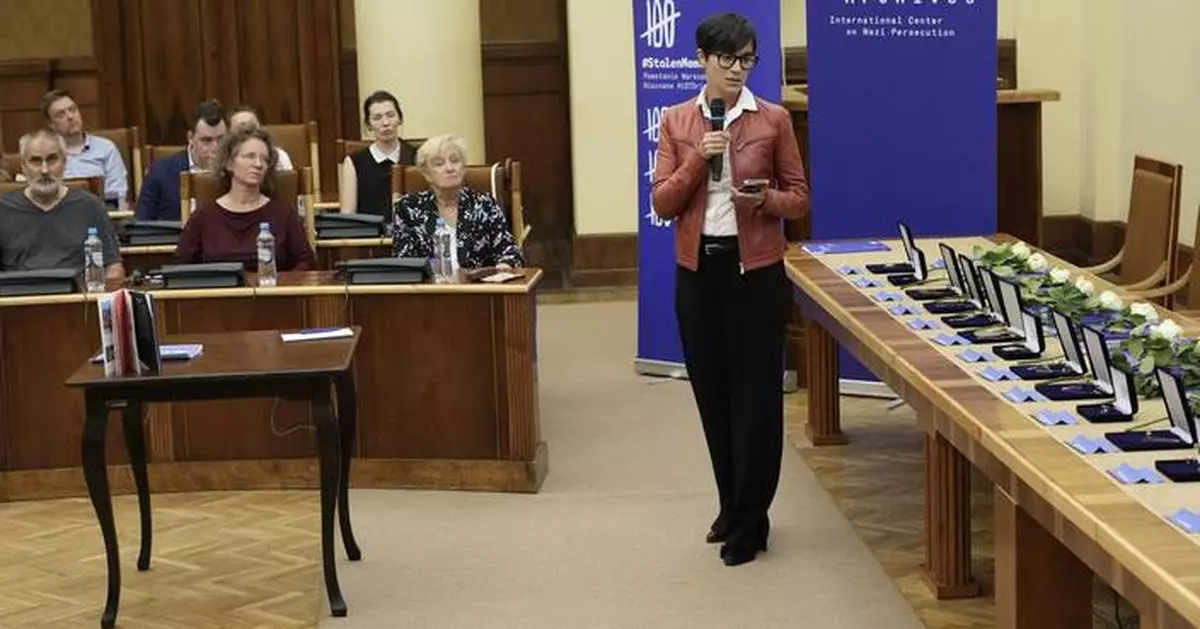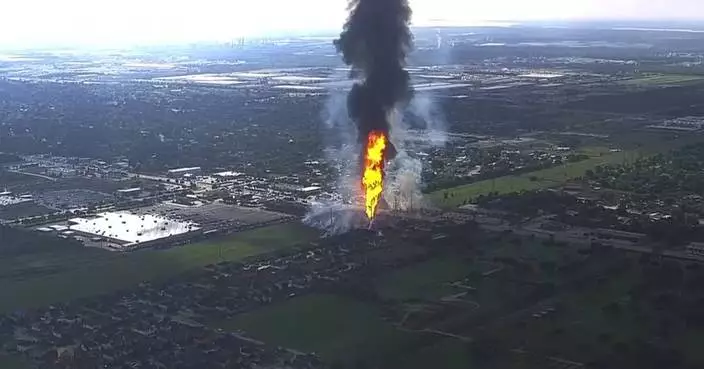WARSAW, Poland (AP) — Stanislawa Wasilewska was 42 when she was captured by Nazi German troops on Aug. 31, 1944, in Warsaw and sent to the women’s concentration camp at Ravensbrück, Germany. From there, she was sent to the Neuengamme forced labor camp, where she was given prisoner number 7257 and had her valuables seized.
Eighty years later, Germany's Arolsen Archives returned Wasilewska's jewelry to her grandson and great-granddaughter at an emotional ceremony in Warsaw late Tuesday during which families of 12 Polish inmates of World War II Nazi German concentration camps were given back their confiscated belongings.
Click to Gallery
WARSAW, Poland (AP) — Stanislawa Wasilewska was 42 when she was captured by Nazi German troops on Aug. 31, 1944, in Warsaw and sent to the women’s concentration camp at Ravensbrück, Germany. From there, she was sent to the Neuengamme forced labor camp, where she was given prisoner number 7257 and had her valuables seized.
A relative shows golden jewelry that was confiscated by Nazi Germans from Zofia Strusińska and her sister Józefa Skórka, who were captured by Nazi troops during Warsaw Uprising in 1944 and taken to a forced labor camp. Their seized items that had been stored at Germany's Arolsen Archives, were returned to their relatives in a ceremony in Warsaw, Poland, on Tuesday, Sept. 10, 2024, in which 10 other families also had belongings of their relatives returned. (AP Photo/Czarek Sokolowski)
A relative shows golden jewelry that was confiscated by Nazi Germans from Zofia Strusińska and her sister Józefa Skórka, who were captured by Nazi troops during Warsaw Uprising in 1944 and taken to a forced labor camp. Their seized items that had been stored at Germany's Arolsen Archives, were returned to their relatives in a ceremony in Warsaw, Poland, on Tuesday, Sept. 10, 2024, in which 10 other families also had belongings of their relatives returned. (AP Photo/Czarek Sokolowski)
A relative shows a golden ring that was confiscated by Nazi Germans from Zofia Strusińska , who was captured by Nazi troops during Warsaw Uprising in 1944 and taken to a forced labor camp. Her seized items that had been stored at Germany's Arolsen Archives, were returned to Strusińska's relatives in a ceremony in Warsaw, Poland, on Tuesday, Sept. 10, 2024, in which 10 other families also had belongings of their relatives returned.(AP Photo/Czarek Sokolowski)
Amber crucifixes and golden jewelry that were confiscated by Nazi Germans from Stanislawa Wasilewska, pictured in the family photos, who was captured by Nazi troops during Warsaw Uprising in 1944 and taken to a forced labor camp. The items that had been stored at Germany's Arolsen Archives, were returned to Wasilewska's relatives in a ceremony in Warsaw, Poland, on Tuesday, Sept. 10, 2024, in which 10 other families also had belongings of their relatives returned. (AP Photo/Czarek Sokolowski)
A relative shows amber crucifixes and jewelry that were confiscated by Nazi Germans from Stanislawa Wasilewska, who was captured by Nazi troops during Warsaw Uprising in 1944 and taken to a forced labor camp. The items that had been stored at Germany's Arolsen Archives, were returned to Wasilewska's relatives in a ceremony in Warsaw, Poland, on Tuesday, Sept. 10, 2024, in which 10 other families also had belongings of their relatives returned. (AP Photo/Czarek Sokolowski)
The director of Germany's Arolsen Archives, Floriane Azoulay, talks to the relatives of 12 inmates of World War II Nazi Germany's concentration camps at the start of a ceremony in which the relatives were given back personal items and jewellery that the Nazis had seized from them during the war and which were recently stored at the archives, in Warsaw, Poland, Tuesday Sept. 10, 2024. (AP Photo/Czarek Sokolowski)
Some relatives had tears in their eyes as they received the mementoes of their long-gone, often unknown family members. More such ceremonies are planned.
Wasilewska's family was given back her two amber crucifixes, part of a golden bracelet and a gold wristwatch engraved with the initials KW and the date 7-3-1938, probably marking her wedding to Konstanty Wasilewski.
“This is an important moment in our lives, because this is a story that we did not fully know about and it came to light,” Wasilewska's great-granddaughter, Malgorzata Koryś, 35, told The Associated Press.
When Nazi Germany was defeated in 1945, Wasilewska was taken by the Red Cross from Neuengamme to Sweden, but later returned to Poland. She is buried in her native Grodzisk Mazowiecki, near Warsaw.
From another family, Adam Wierzbicki, 29, was given two rings which belonged to Zofia Strusińska and a golden chain and tooth filling of Józefa Skórka, two married sisters of his great-grandfather, Stanislaw Wierzbicki. Captured together on Aug. 4, like Wasilewska, the sisters also went through Ravensbrück and Neuengamme before the Red Cross took them to Sweden.
A family story has it that a Swedish man fell in love with one of the sisters and wanted them both to stay, promising to take care of them, but they decided to go back to Poland, Wierzbicki said.
The return of their jewelry is “important for sentimental reasons but also for historical reasons,” Wierzbicki told the AP.
The items were returned by the Arolsen Archives, the international center on Nazi persecution, which holds information on about 17.5 million people. It stores some 2,000 items which were seized by the Nazis from concentration camp inmates from more than 30 countries, and are intended to be returned to their relatives.
When the prisoners were sent to concentration camps, their valuables — wedding rings, watches, gold chains, earrings and other items — were confiscated and put in envelopes marked with their owners’ names. That allowed for the items’ return to the families, 80 years later.
It was an uplifting moment when the archives volunteers contacted him, Wierzbicki said, but there was also the thought that “history will catch up with you. It was like my aunts were looking at me from the past."
The archives launched its restitution campaign, “Warsaw Uprising: 100 Untold Stories,” to mark 80 years since the city rose up against the Nazi invaders on Aug. 1, 1944, with the goal of reaching the families of 100 victims and reviving the memory of them through their belongings.
Archive director Floriane Azoulay said they are only custodians of the belongings, which should be returned to the families.
“Every object that we return is personal,” Azoulay said. "And it’s the last personal thing a person had on them before they became a prisoner, before they became a number. So it is a very important object for a family.”
Volunteer Manuela Golc has found more than 100 Polish families and each time it's an emotional moment.
“It is often the case that we pass on information that the family was not aware of at all," Golc said. "So this conversation on the phone ... is also very difficult. But in the end we are very happy that the memento is returning to the family.”
If she was unable to trace a family online or through official records, she traveled to cemeteries, leaving notes waterproofed against the rain for the families on the graves of people whose data matched those in the archives, asking them to get in touch.
The Warsaw Uprising was launched by the underground resistance Home Army with the goal of taking control of the capital city ahead of the advancing Soviet troops. It fell after 63 days of heroic struggle that cost the lives of some 200,000 fighters and civilians. In revenge, the Germans expelled the surviving residents and reduced Warsaw to ruins.
During German occupation in 1939-45, Poland lost some 6 million residents, half of them Jewish, and suffered huge material losses.
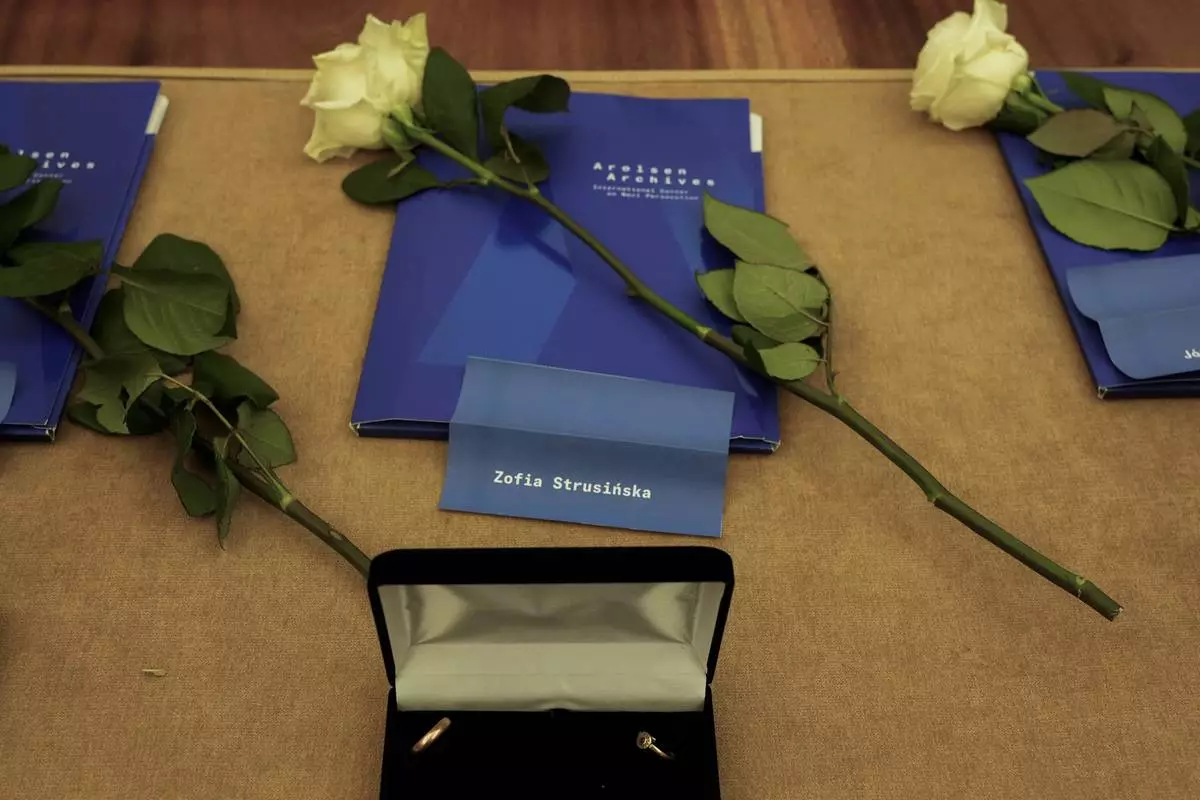
A relative shows golden jewelry that was confiscated by Nazi Germans from Zofia Strusińska who were captured by Nazi troops during Warsaw Uprising in 1944 and taken to a forced labor camp. Their seized items that had been stored at Germany's Arolsen Archives, were returned to their relatives in a ceremony in Warsaw, Poland, on Tuesday, Sept. 10, 2024, in which 10 other families also had belongings of their relatives returned. (AP Photo/Czarek Sokolowski)
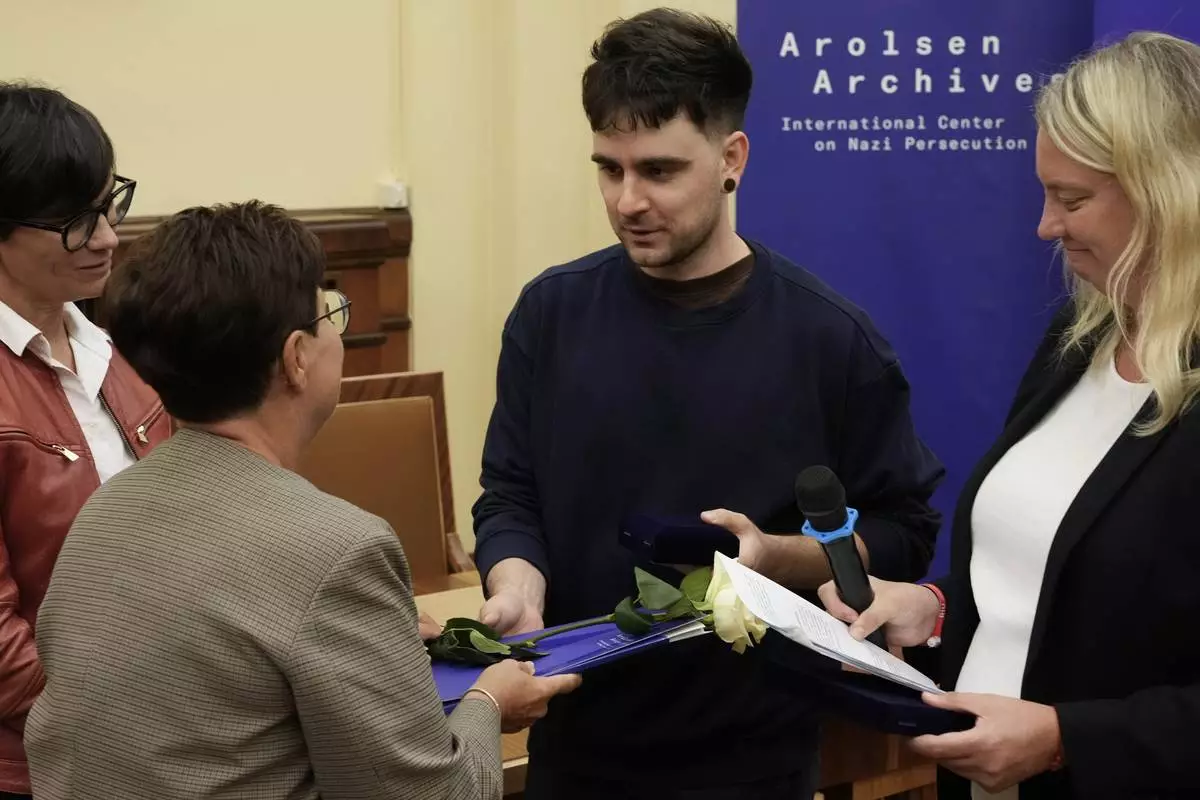
A relative shows golden jewelry that was confiscated by Nazi Germans from Zofia Strusińska and her sister Józefa Skórka, who were captured by Nazi troops during Warsaw Uprising in 1944 and taken to a forced labor camp. Their seized items that had been stored at Germany's Arolsen Archives, were returned to their relatives in a ceremony in Warsaw, Poland, on Tuesday, Sept. 10, 2024, in which 10 other families also had belongings of their relatives returned. (AP Photo/Czarek Sokolowski)
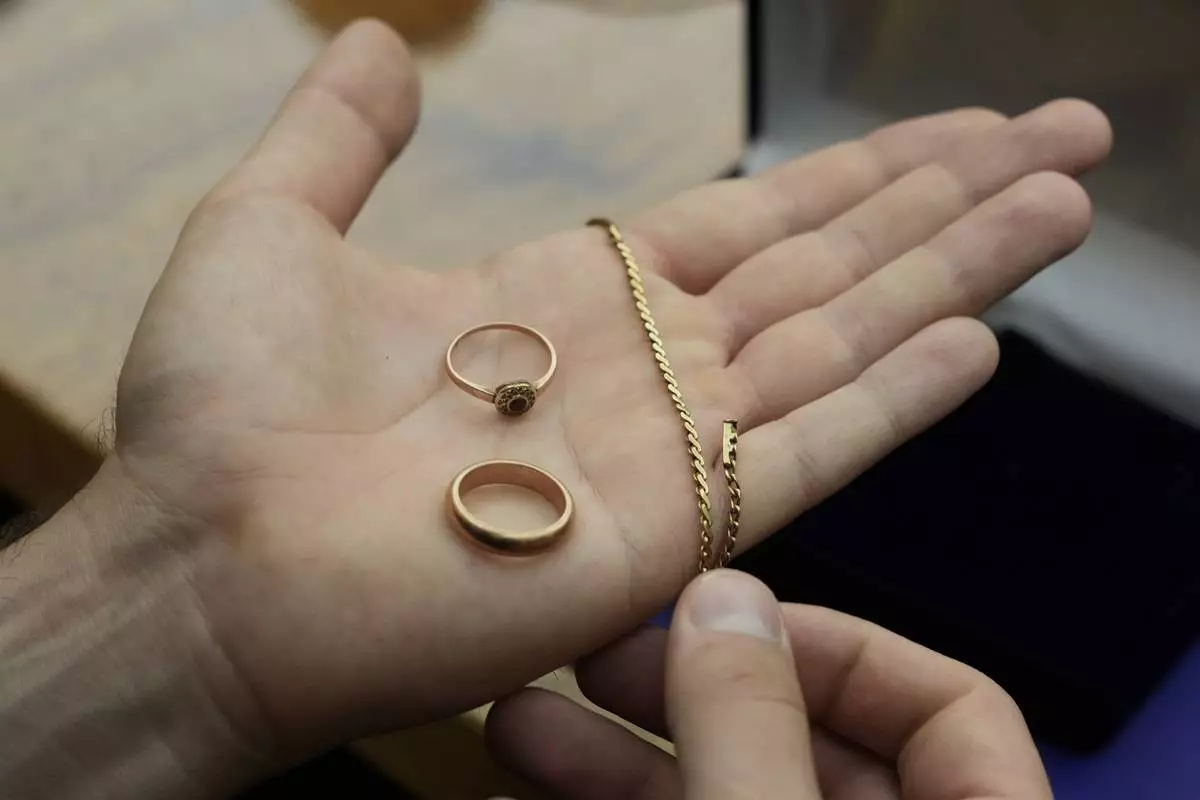
A relative shows golden jewelry that was confiscated by Nazi Germans from Zofia Strusińska and her sister Józefa Skórka, who were captured by Nazi troops during Warsaw Uprising in 1944 and taken to a forced labor camp. Their seized items that had been stored at Germany's Arolsen Archives, were returned to their relatives in a ceremony in Warsaw, Poland, on Tuesday, Sept. 10, 2024, in which 10 other families also had belongings of their relatives returned. (AP Photo/Czarek Sokolowski)
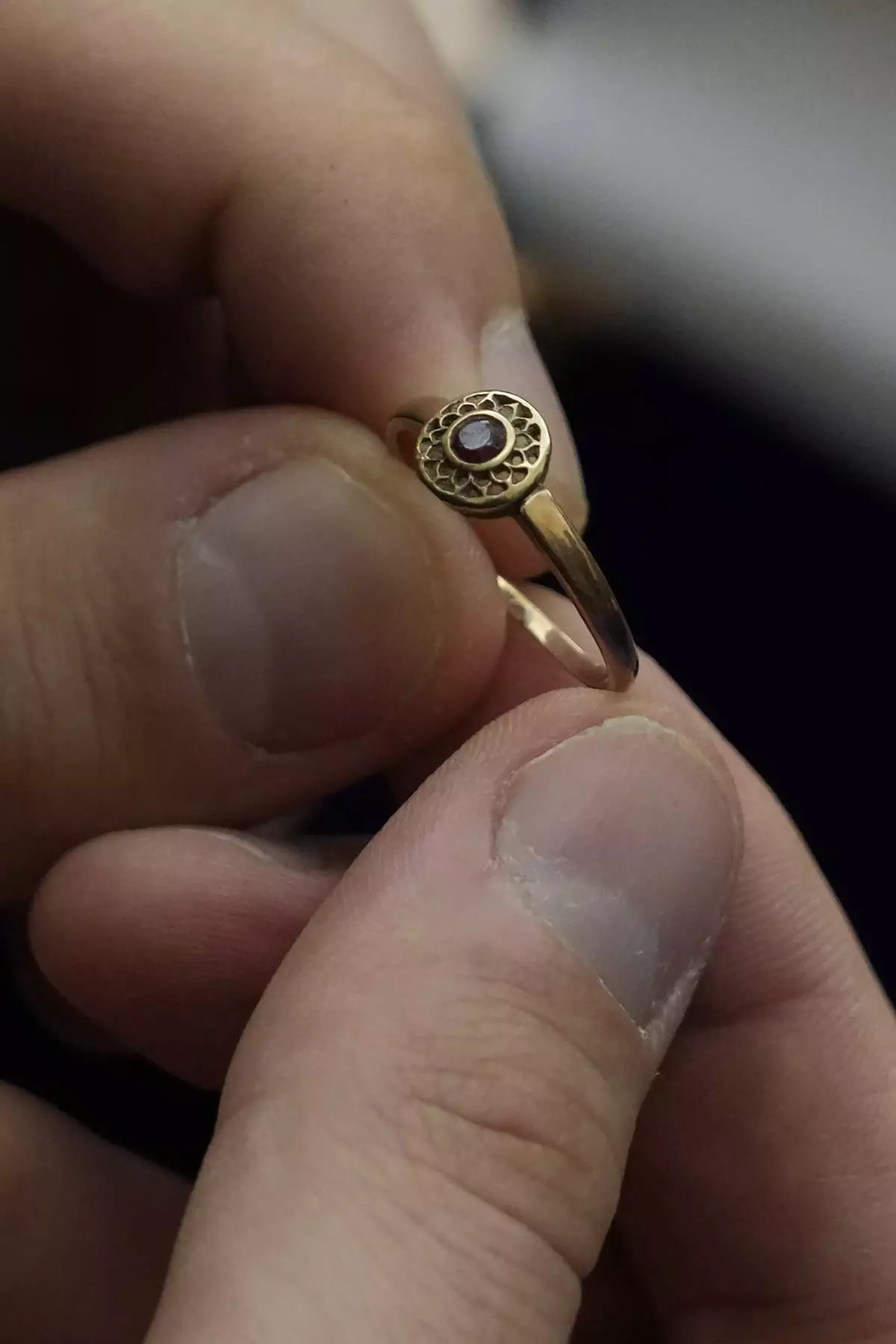
A relative shows a golden ring that was confiscated by Nazi Germans from Zofia Strusińska , who was captured by Nazi troops during Warsaw Uprising in 1944 and taken to a forced labor camp. Her seized items that had been stored at Germany's Arolsen Archives, were returned to Strusińska's relatives in a ceremony in Warsaw, Poland, on Tuesday, Sept. 10, 2024, in which 10 other families also had belongings of their relatives returned.(AP Photo/Czarek Sokolowski)
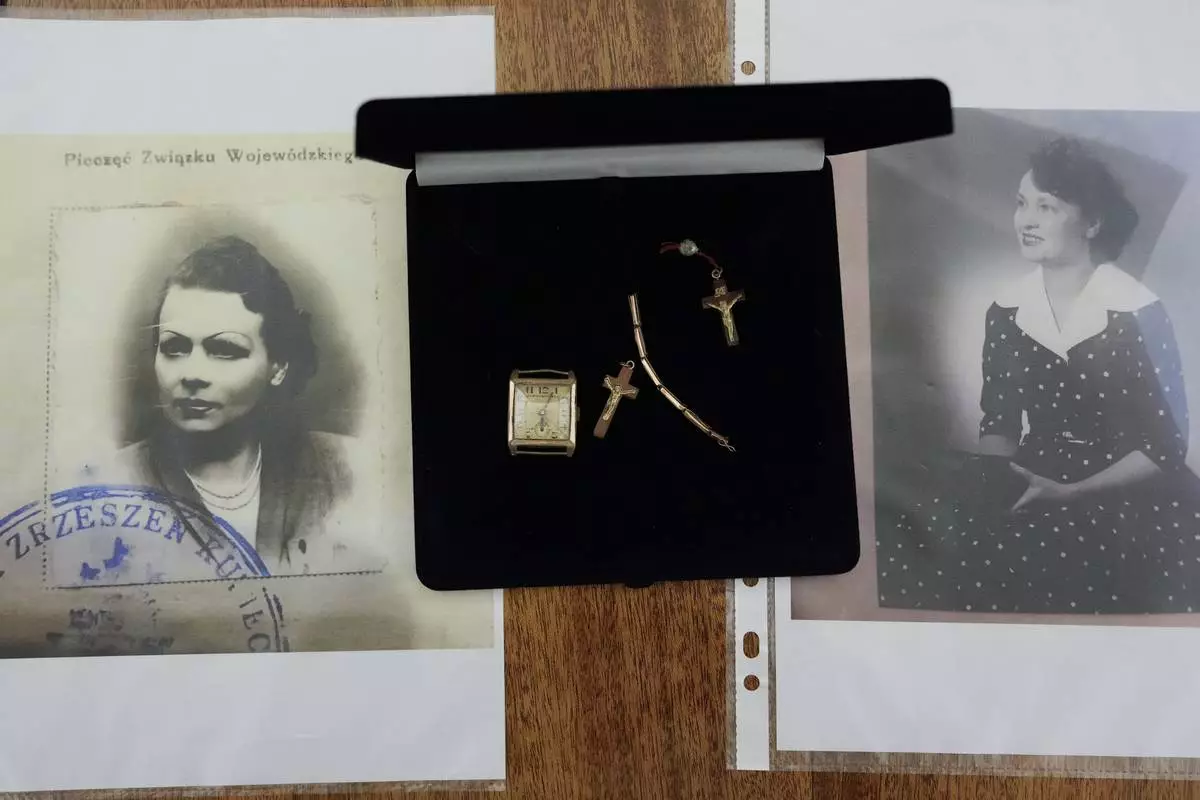
Amber crucifixes and golden jewelry that were confiscated by Nazi Germans from Stanislawa Wasilewska, pictured in the family photos, who was captured by Nazi troops during Warsaw Uprising in 1944 and taken to a forced labor camp. The items that had been stored at Germany's Arolsen Archives, were returned to Wasilewska's relatives in a ceremony in Warsaw, Poland, on Tuesday, Sept. 10, 2024, in which 10 other families also had belongings of their relatives returned. (AP Photo/Czarek Sokolowski)
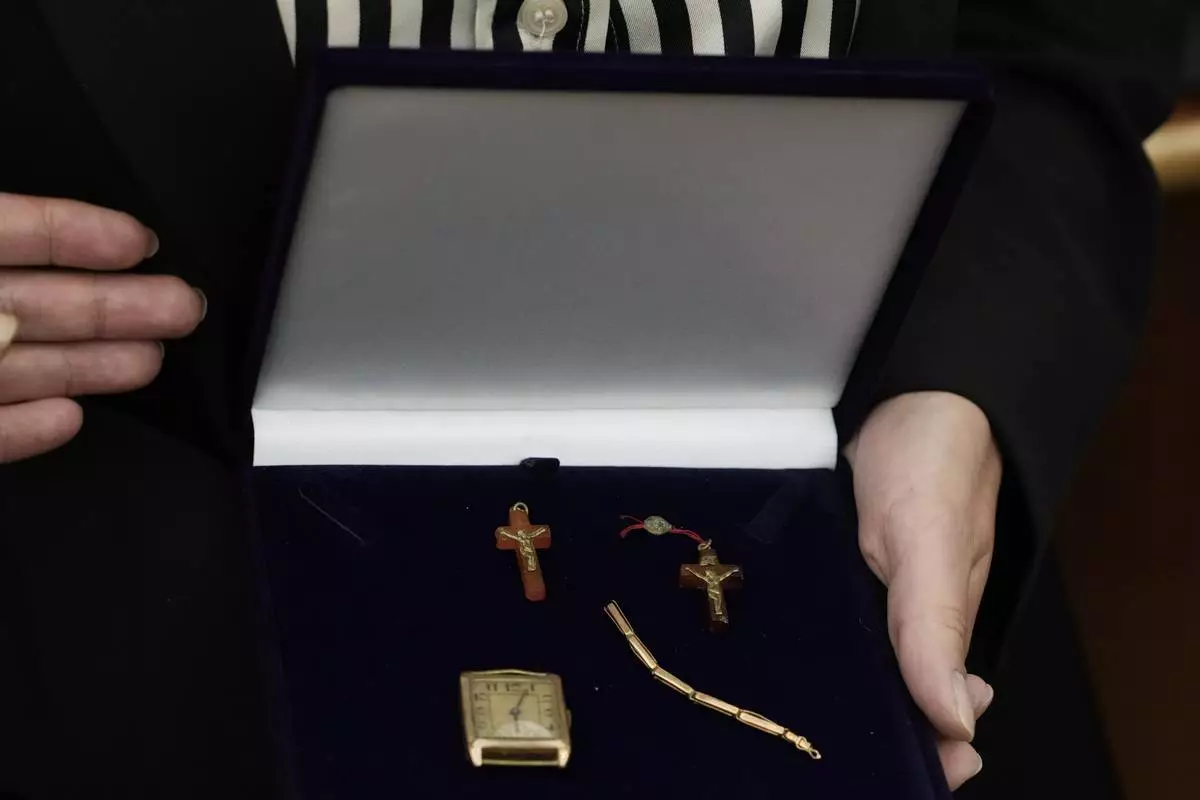
A relative shows amber crucifixes and jewelry that were confiscated by Nazi Germans from Stanislawa Wasilewska, who was captured by Nazi troops during Warsaw Uprising in 1944 and taken to a forced labor camp. The items that had been stored at Germany's Arolsen Archives, were returned to Wasilewska's relatives in a ceremony in Warsaw, Poland, on Tuesday, Sept. 10, 2024, in which 10 other families also had belongings of their relatives returned. (AP Photo/Czarek Sokolowski)
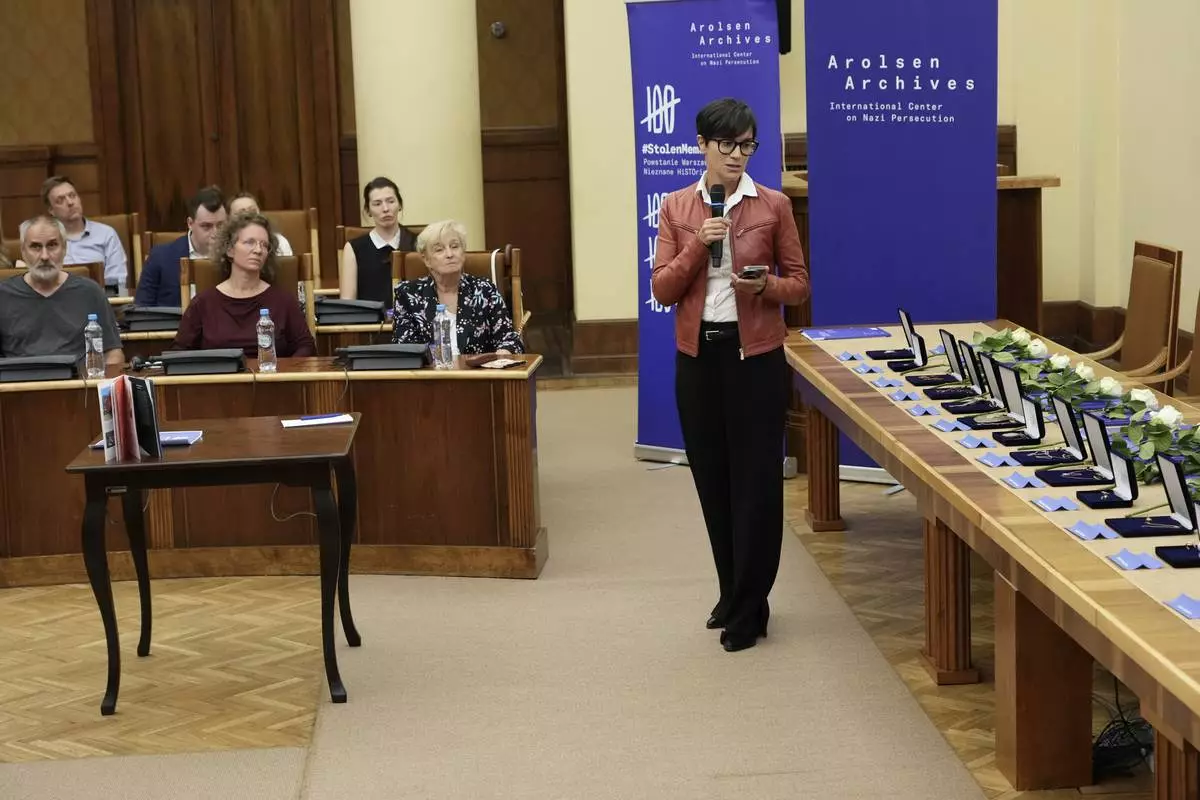
The director of Germany's Arolsen Archives, Floriane Azoulay, talks to the relatives of 12 inmates of World War II Nazi Germany's concentration camps at the start of a ceremony in which the relatives were given back personal items and jewellery that the Nazis had seized from them during the war and which were recently stored at the archives, in Warsaw, Poland, Tuesday Sept. 10, 2024. (AP Photo/Czarek Sokolowski)
SRINAGAR, India (AP) — In Indian-controlled Kashmir, many people boycotted elections for decades in protest against Indian rule. But in the run-up to the local election beginning Wednesday, many are willing to buck that trend and use their vote to deny Prime Minister Narendra Modi’s party the power to form a local government in the disputed region.
The vote is the first in a decade, and the first since Modi’s Hindu nationalist government in 2019 scrapped the Muslim-majority region’s special status and downgraded the former state to a federally governed territory. The move — which largely resonated in India and among Modi supporters — was mostly opposed in the region as an assault on its identity and autonomy.
“Boycotts will not work in this election,” said Abdul Rashid, a resident in southern Kashmir’s Shangus village. “There is a desperate need to end the onslaught of changes coming from there (India).”
The election will allow residents to have their own truncated government and a local parliament called an assembly, instead of remaining under New Delhi’s direct rule. The region’s last assembly election was held in 2014, after which Modi’s Bharatiya Janata Party for the first time ruled the region in a coalition with the local Peoples Democratic Party.
But the government collapsed in 2018 after BJP withdrew from the coalition. Polls in the past have been marked with violence, boycotts and vote-rigging, even though India called them a victory over separatism.
This time, New Delhi says the polls are ushering in democracy after more than three decades of strife. However, many locals see the vote as an opportunity not only to elect their own representatives but also to register their protest against the 2019 changes.
Polling will be held in three phases. The second and third phases are scheduled for Sept. 25 and Oct. 1. Votes will be counted on Oct. 8, with results expected that day.
Kashmir is divided between nuclear-armed rivals India and Pakistan. Since 1947, the neighbors have fought two wars over its control, after British rule of the subcontinent ended with the creation of the two countries. Both claim the Himalayan territory in its entirety.
In 2019, the Indian-controlled part of the region was divided into two territories, Ladakh and Jammu-Kashmir, ruled directly by New Delhi. The region has been on edge since it lost its flag, criminal code, constitution and inherited protections on land and jobs.
Multiple pro-India Kashmiri parties, many of whose leaders were among thousands jailed in 2019, are contesting the election, promising to reverse those changes. Some lower-rung separatist leaders, who in the past dismissed polls as illegitimate exercises under military occupation, are also running for office as independent candidates.
India’s main opposition Congress party, which favors restoration of the region’s statehood, has formed an alliance with the National Conference, the region’s largest party. Modi’s BJP has a strong political base in Hindu-dominated areas of Jammu that largely favor the 2019 changes but is weak in the Kashmir Valley, the heartland of anti-India rebellion.
“Our main concern is governance through local representatives. It will be good for us if the BJP forms the government here as it’s already in power at the center,” said Chuni Lal, a shopkeeper in Jammu city.
The vote will see a limited transition of power from New Delhi to the local assembly, with a chief minister at the top heading a council of ministers. But Kashmir will continue to be a “Union Territory” — a region directly controlled by the federal government — with India’s Parliament remaining its main legislator.
The elected government will have partial control over areas like education, culture and taxation but not over the police. Kashmir’s statehood must be restored for the new government to have powers similar to other states in India. However, it will not have the special powers it enjoyed before the 2019 changes.
Last year, India’s Supreme Court endorsed the government’s 2019 changes but ordered New Delhi to conduct local polls by the end of September and restore Kashmir’s statehood. Modi’s government has promised to restore statehood after the polls but has not specified a timeline.
Elections in Indian-held Kashmir have remained a sensitive issue. Many believe they have been rigged multiple times in favor of local politicians who subsequently became India’s regional enforcers, used to incrementally dilute laws that offered Kashmir a special status and legitimize New Delhi’s militaristic policies.
In the mid-1980s, the region’s dissident political groups emerged as a formidable force against Kashmir’s pro-India political elite but lost the 1987 election widely believed to have been rigged. A public backlash followed, with some young activists taking up arms and demanding a united Kashmir, either under Pakistani rule or independent of both.
India insists the insurgency is Pakistan-sponsored terrorism, a charge Islamabad denies. Tens of thousands of people have been killed in the fighting, which most Kashmiri Muslims consider a legitimate freedom struggle.
Noor Ahmed Baba, a political scientist, said the outcome of the polls “is not going to change the dynamics of the Kashmir dispute” since it will end with a largely powerless legislature, but will be crucial for optics.
“If local parties win, it is going to put some pressure on the central government and perhaps delegitimize from a democratic perspective what has been done to Kashmir. But a BJP win can allow the party to consolidate and validate 2019 changes in the local legislature,” Baba said.
India’s ruling BJP is not officially aligned with any local party, but many politicians believe it is tacitly supporting some parties and independent candidates who privately agree with its stances.
The National Conference party says Modi’s BJP is trying to manipulate the election through independent candidates. “Their (BJP’s) concerted effort is to divide the vote in Kashmir,” said Tanvir Sadiq, a candidate from the National Conference.
The BJP’s national secretary, meanwhile, says his party’s former ally, the Peoples Democratic Party, and the National Conference are being supported by former militants. Ram Madhav said at a recent rally that they want to return the region to its “trouble-filled days.”
For residents whose civil liberties have been curbed, the election is also a chance to choose representatives they hope will address their main issues.
Many say that while the election won’t solve the dispute over Kashmir, it will give them a rare window to express their frustration with Indian control.
“We need some relief and end of bureaucratic rule here,” said Rafiq Ahmed, a taxi driver in the region’s main city of Srinagar.
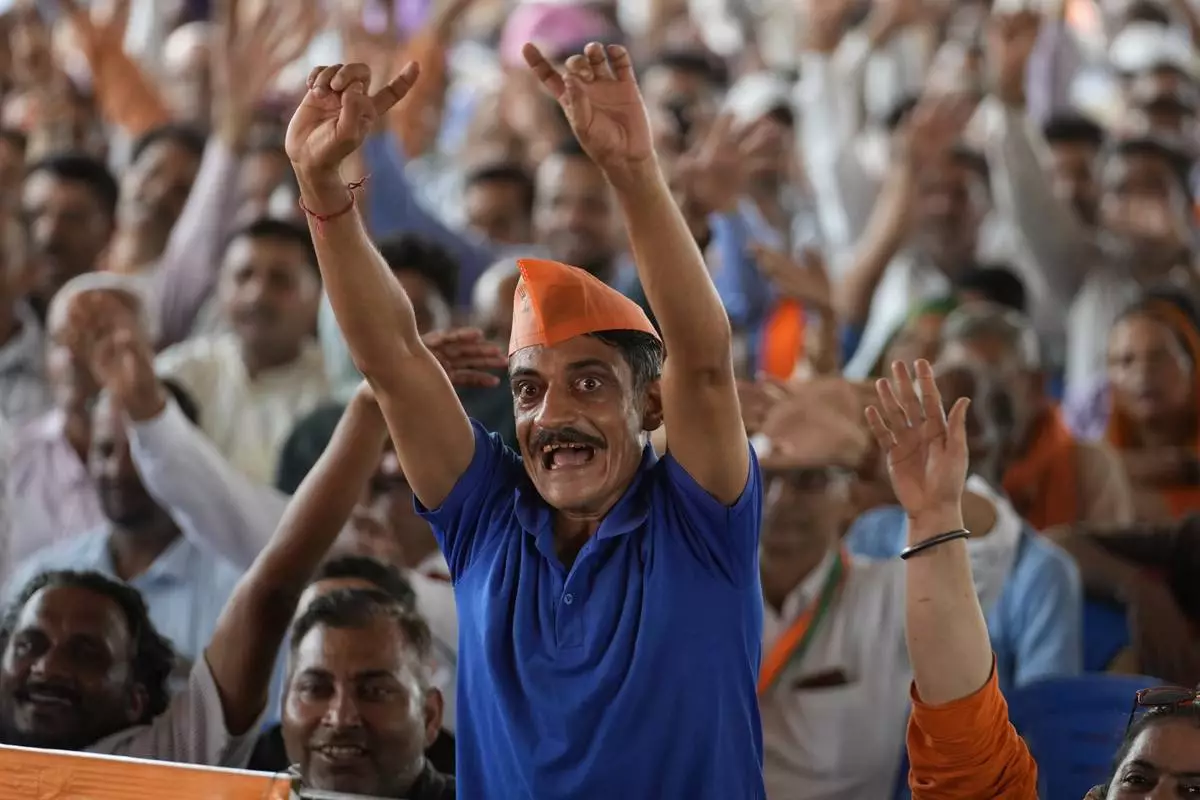
Bharatiya Janata Party (BJP) party workers attend a rally, ahead of Jammu and Kashmir Assembly elections in Jammu, India, Saturday Sep.7, 2024.(AP Photo/Channi Anand, File)
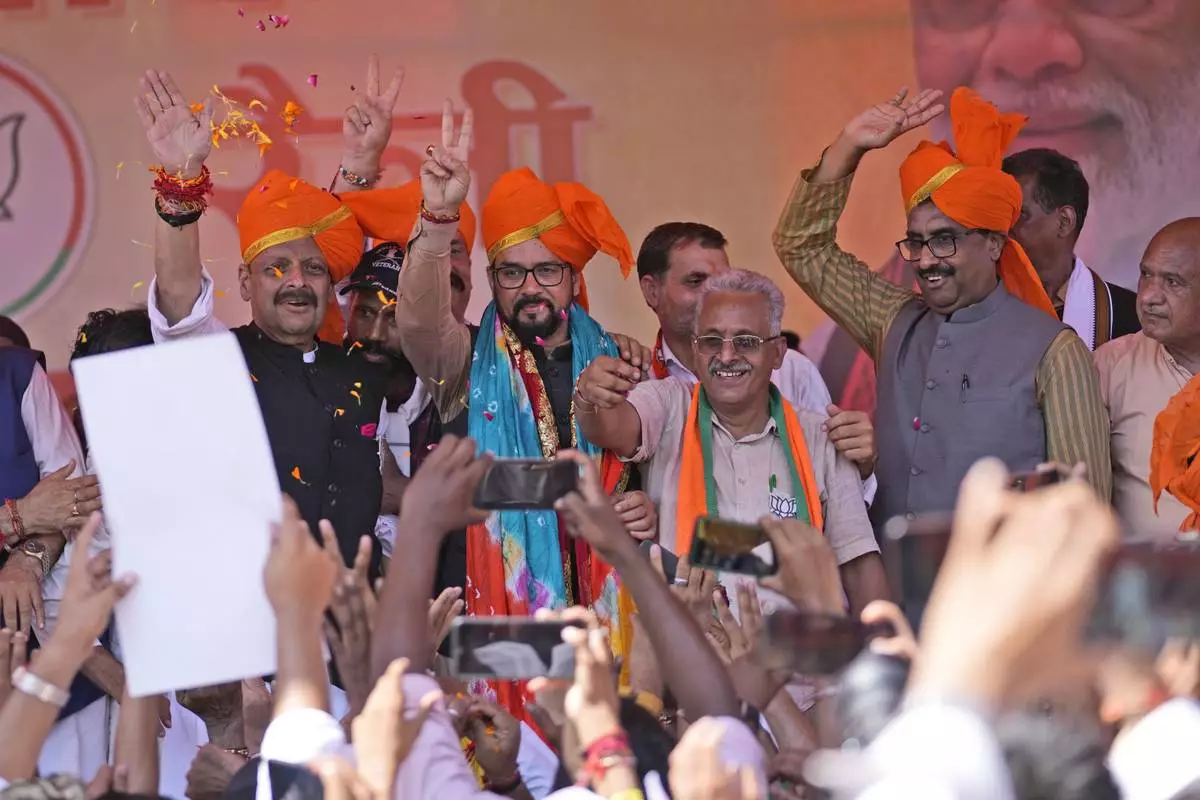
Former union minster and star campaigner of BJP Anurag Thakur and state in charge Ram Madhav wave to supporters during a campaign rally, after party candidates filed the nomination papers for the upcoming Jammu and Kashmir Assembly elections at Nagrota outskirts of Jammu, India, Thursday, Sep.12, 2024.(AP Photo/Channi Anand, File)
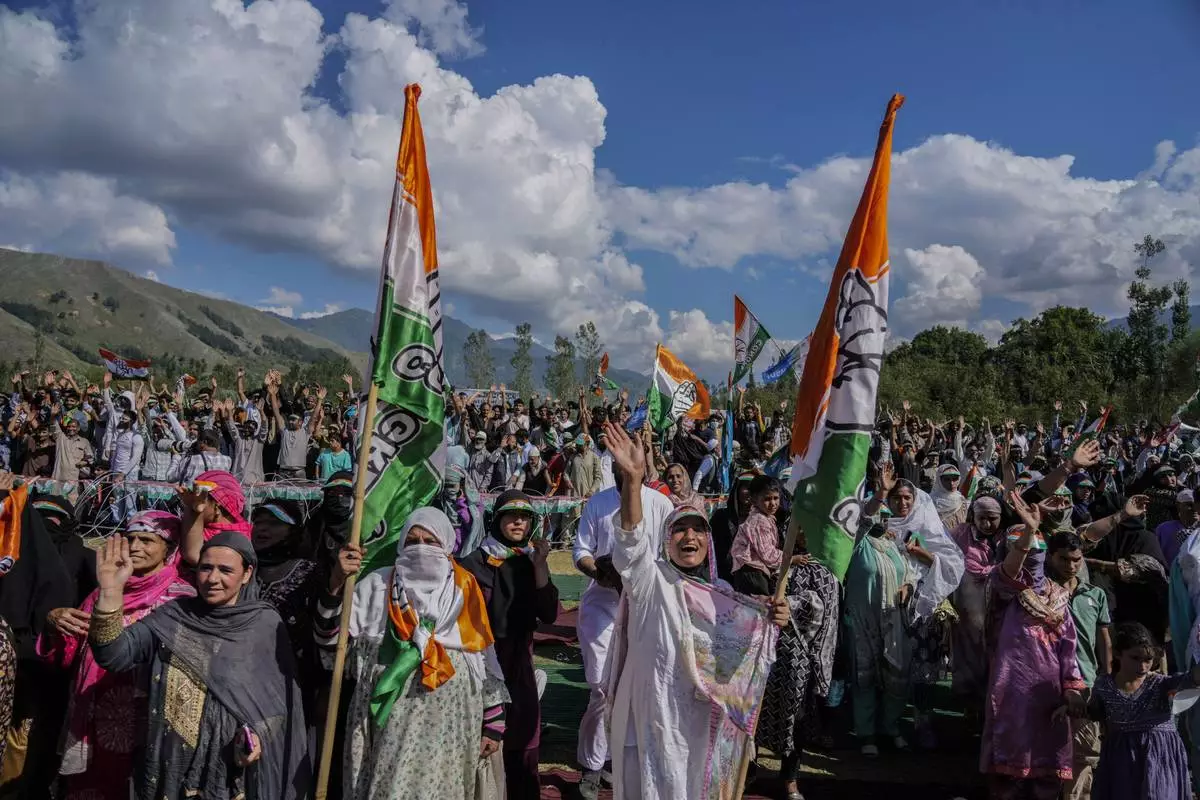
Supporters of India's opposition Congress party, wave during an election rally at Dooru some 78 kilometers (49 miles) south of Srinagar, Indian controlled Kashmir,Wednesday, Sept. 4, 2024. (AP Photo/Mukhtar Khan, File)
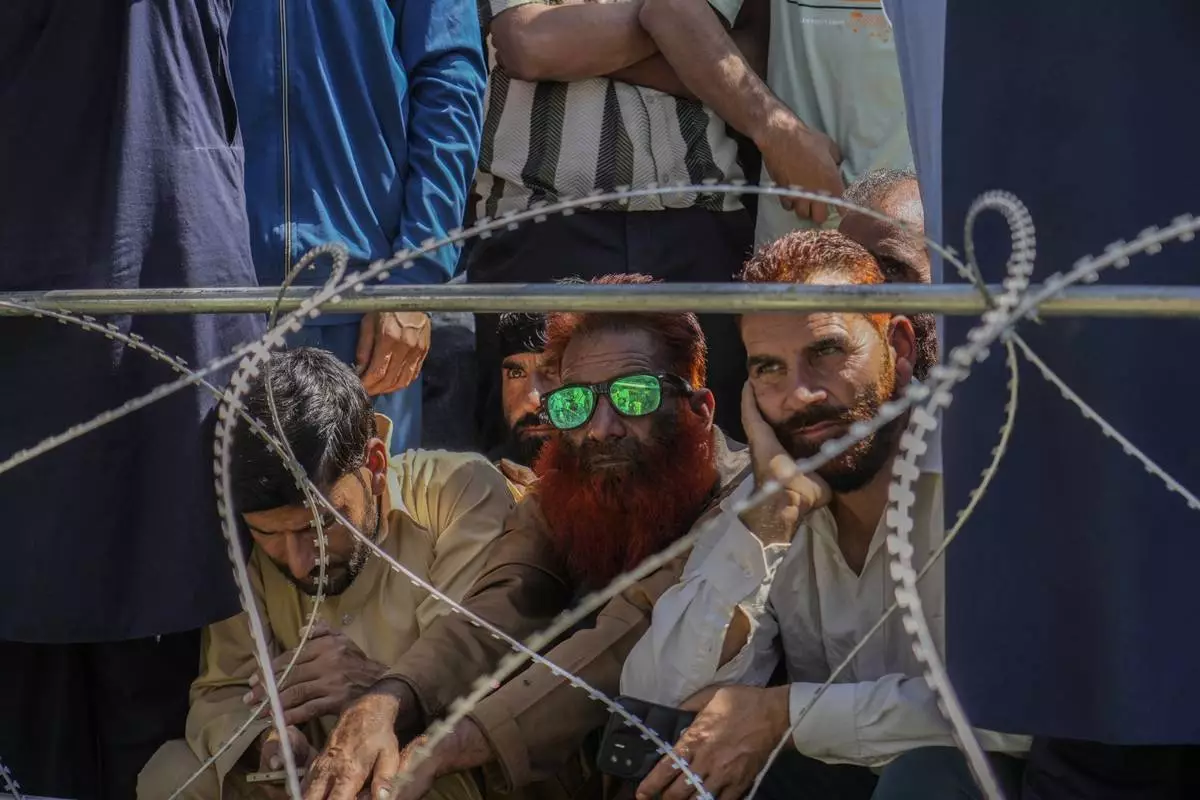
Supporters of Awami Ittehad Party (AIP) leader Sheikh Abdul Rashid, also known as Engineer Rashid, attend a public rally at Baramulla, some 55 kilometers (34 miles) north of Srinagar, Indian controlled Kashmir, Sept. 12, 2024. (AP Photo/Mukhtar Khan, File)
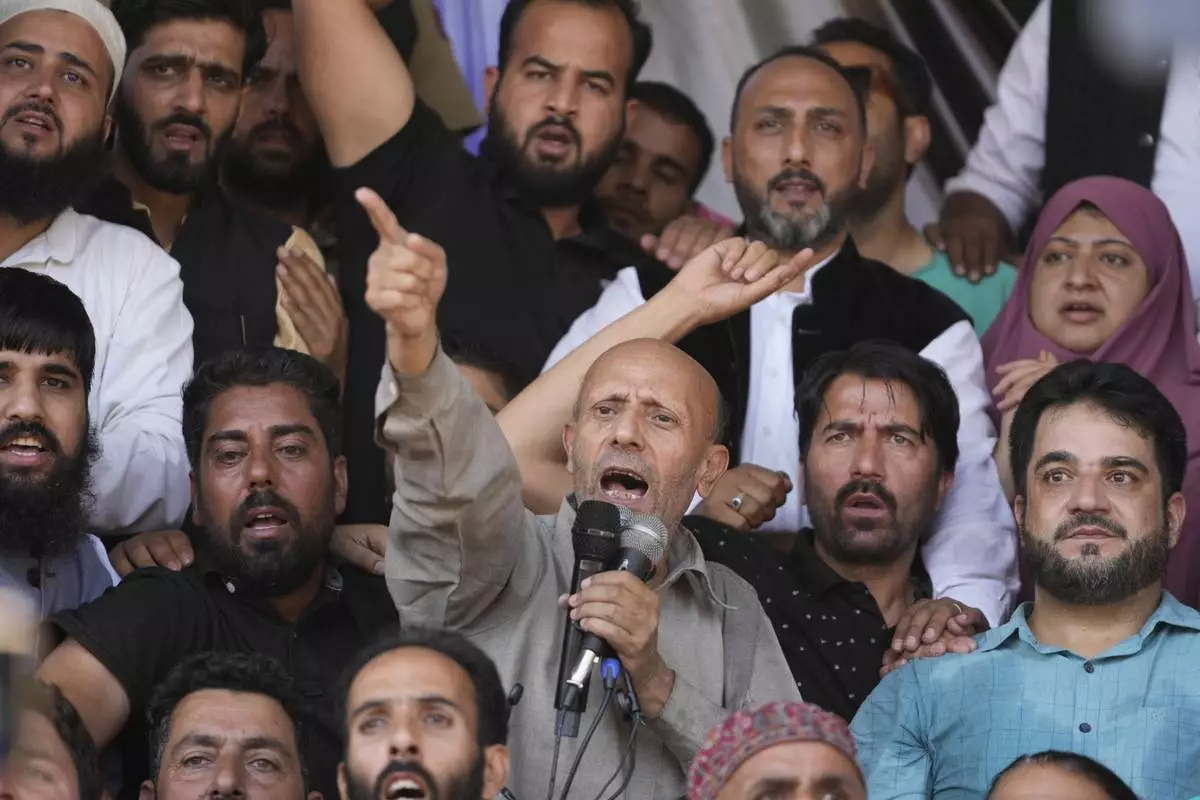
Awami Ittehad Party (AIP) leader Sheikh Abdul Rashid, also known as Engineer Rashid, speaks during a public rally at Baramulla, some 55 kilometers (34 miles) north of Srinagar, Indian controlled Kashmir, Sept. 12, 2024. (AP Photo/Mukhtar Khan, File)
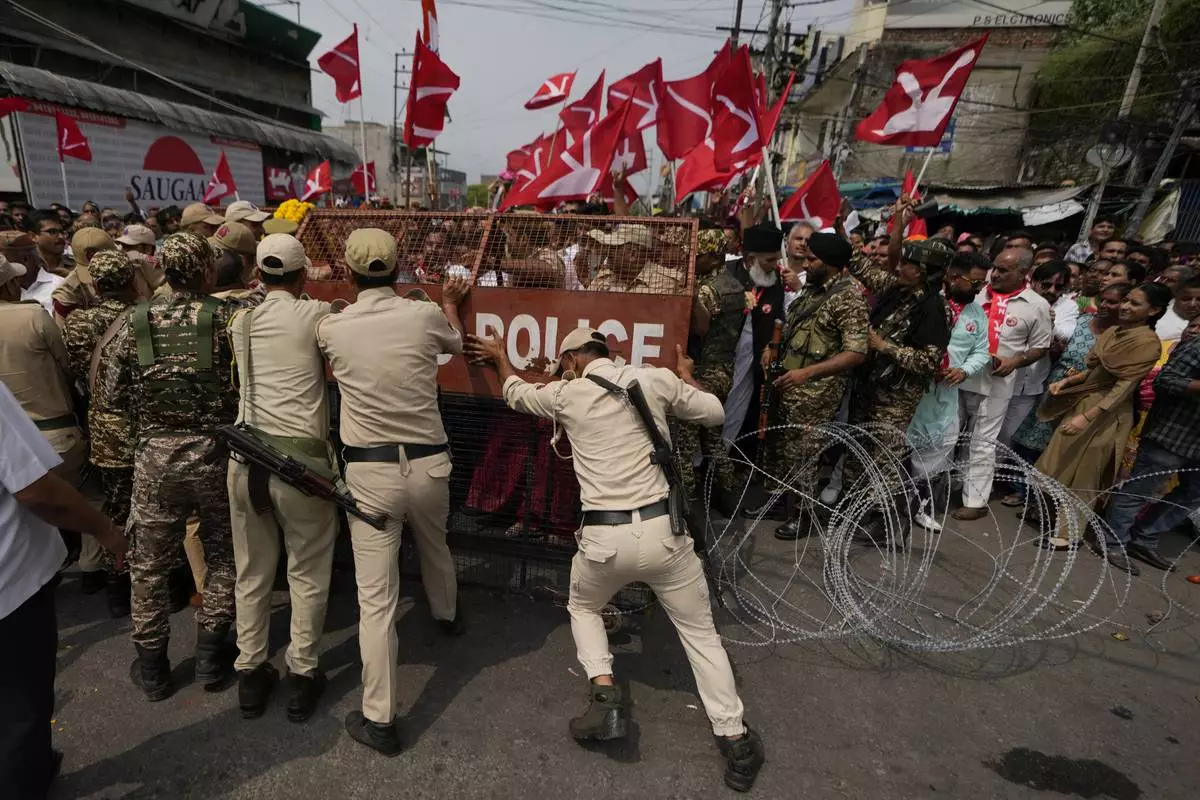
Policemen stop supporters of National Conference Party from accompanying their candidate during the filing of nomination papers for the upcoming Jammu and Kashmir Assembly elections in Jammu, India, Sept.10, 2024. (AP Photo/Channi Anand, File)
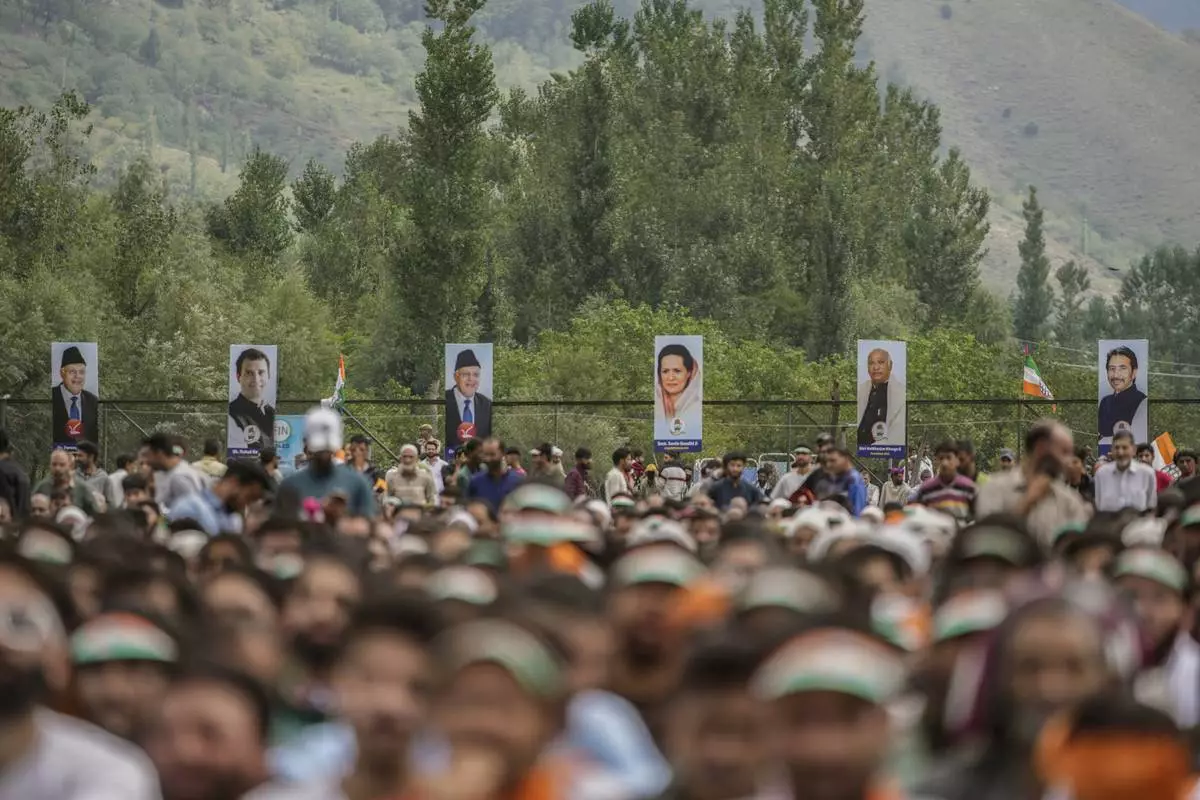
Supporters listen as India's opposition Congress party leader Rahul Gandhi, unseen, speaks during an election rally at Dooru some 78 kilometers south of Srinagar, Indian controlled Kashmir, Wednesday, Sept. 4, 2024. (AP Photo/Mukhtar Khan, FILE)
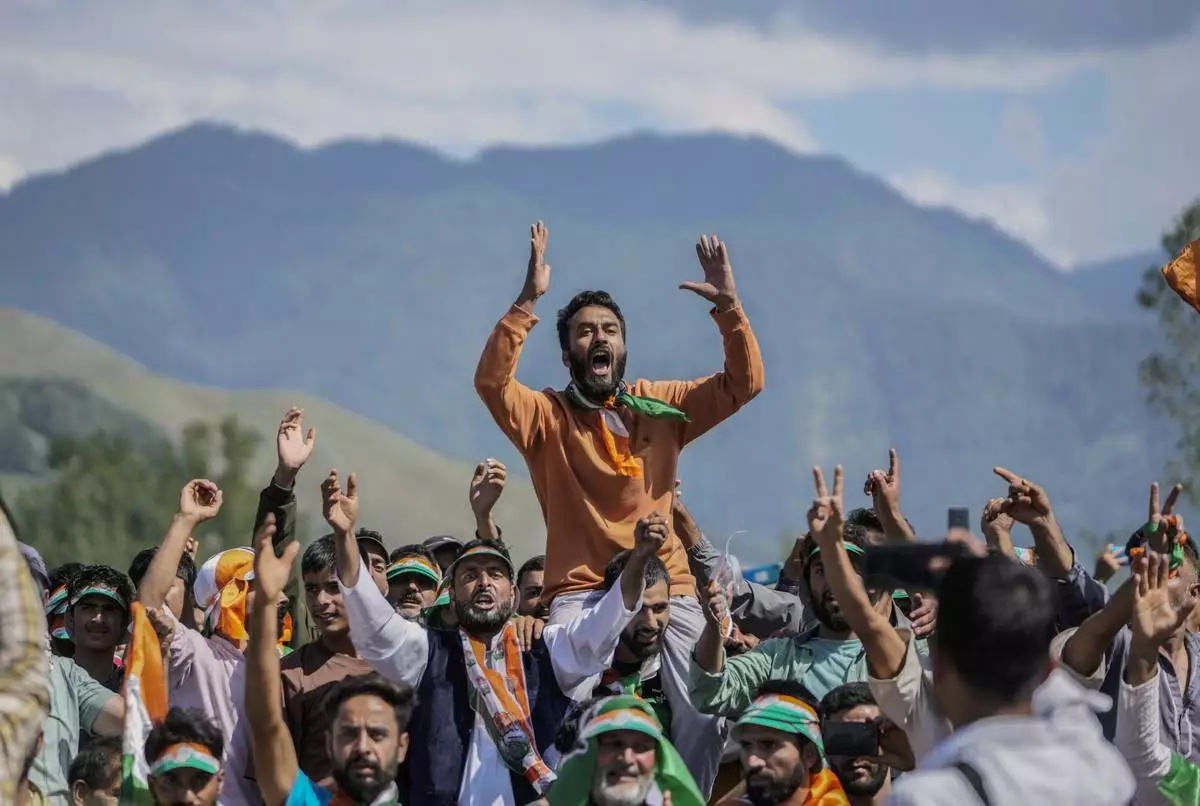
Supporters of India's opposition Congress party leader Rahul Gandhi, shout slogans during an election rally at Dooru, some 78 kilometers south of Srinagar, Indian controlled Kashmir, Sept. 4, 2024. (AP Photo/Mukhtar Khan, File)
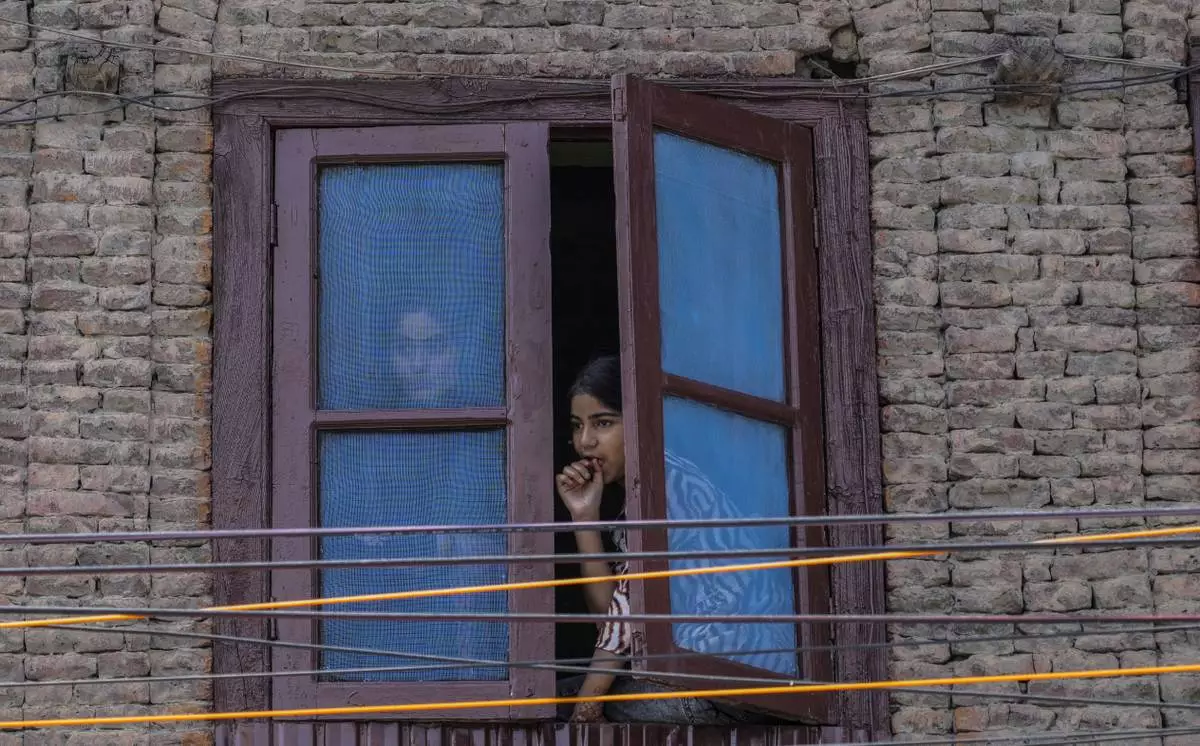
People watch from a window during a road show of Peoples Democratic Party (PDP) candidate Arif Laigroo, in Srinagar, Indian-controlled Kashmir Sunday, Sept. 15, 2024. (AP Photo/Mukhtar Khan, File)
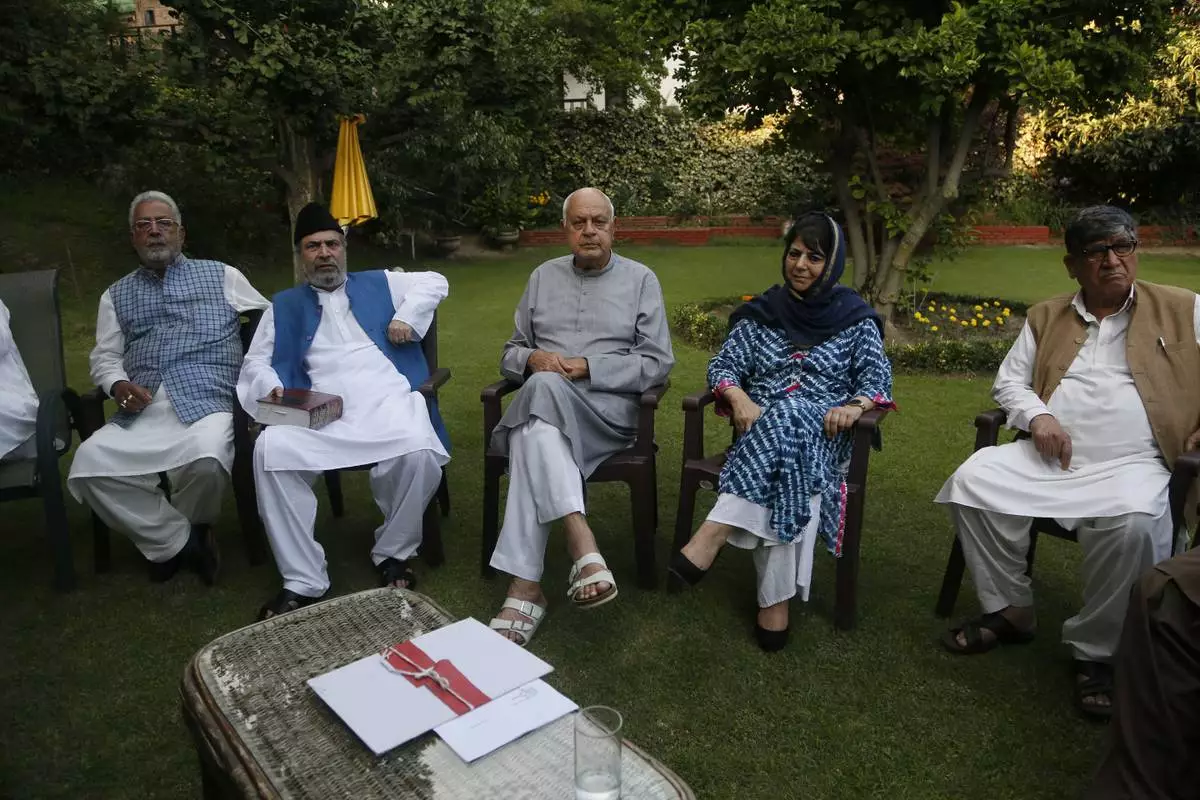
National Conference (NC) President Farooq Abdullah, center, Peoples Democratic Party (PDP) leader Mehbooba Mufti, second right, and other leaders sit during an all parties meeting on restoration of the special status that was stripped last year from Indian-administered Kashmir, in Srinagar, India. (AP Photo/Mukhtar Khan, File)
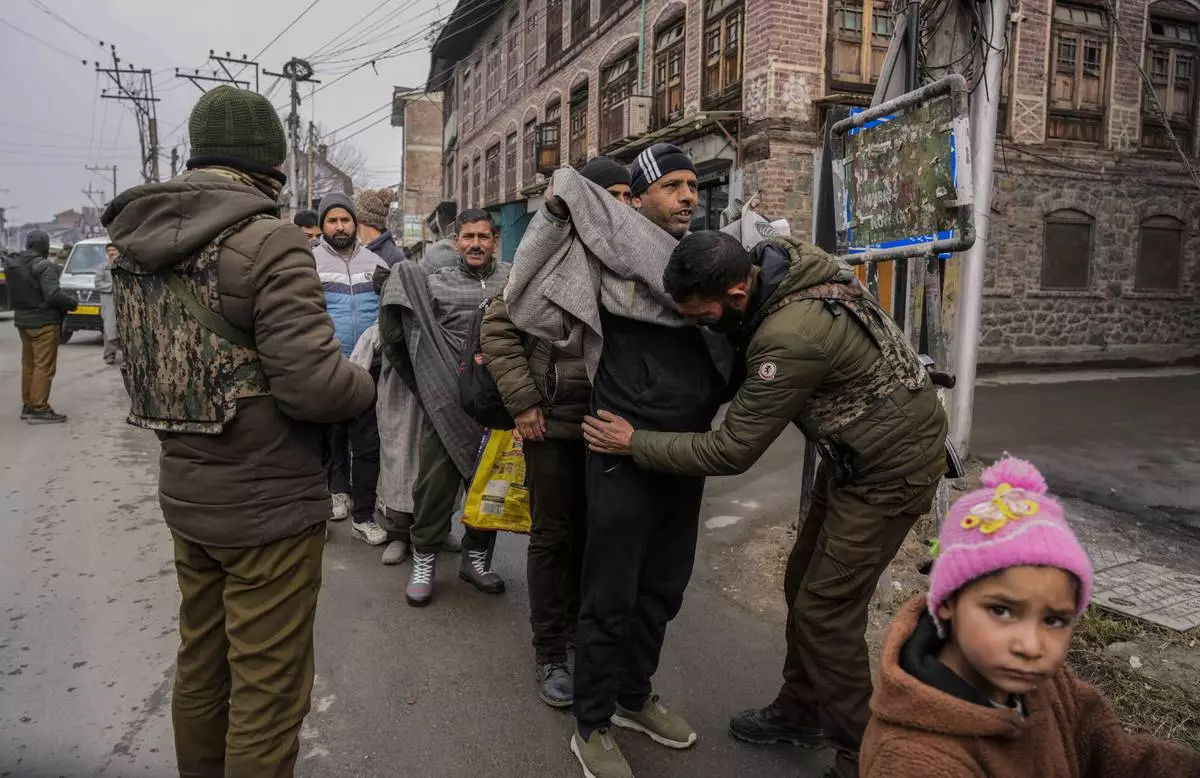
A child looks on as Indian policemen frisk Kashmiri pedestrians during a surprise security check in Srinagar, Indian controlled Kashmir, Monday, Jan. 9, 2023. (AP Photo/Mukhtar Khan, File)
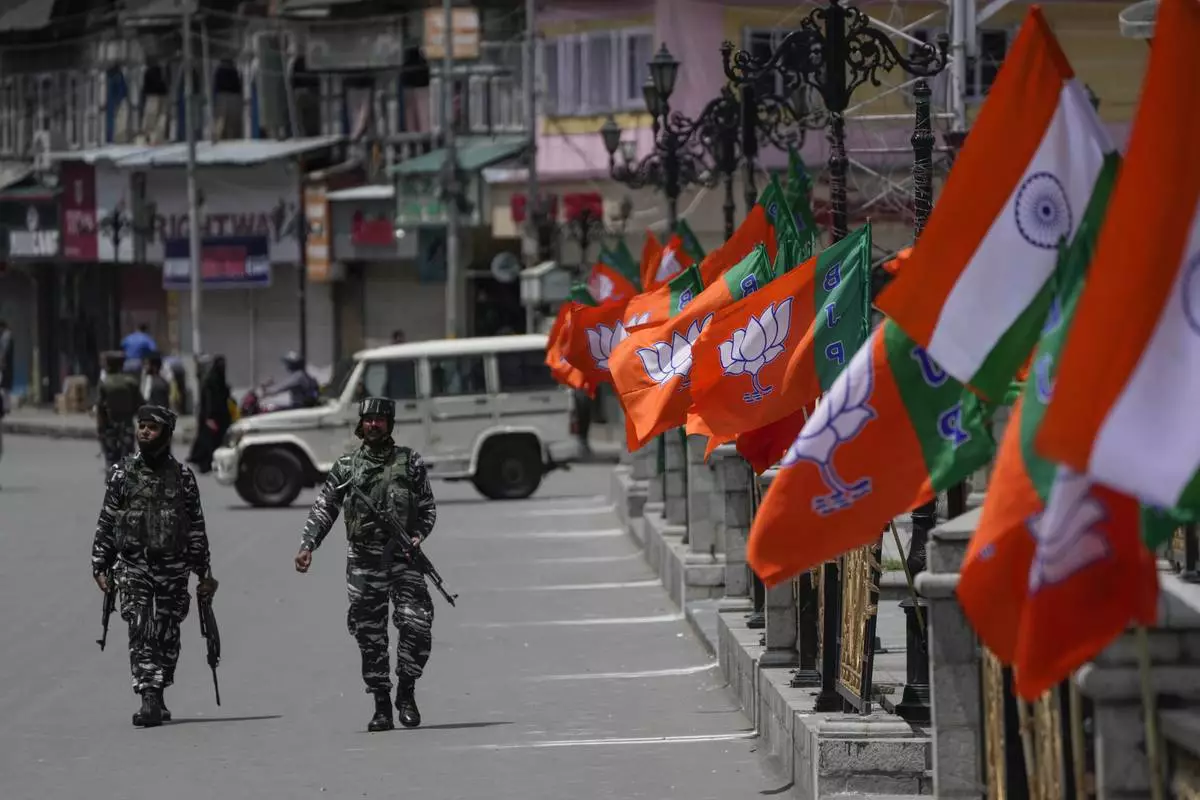
Indian security forces walk past Indian flags and flags of India's ruling Bharatiya Janata Party (BJP) as a motorcycle rally by BJP youth wing to the Kargil War Memorial passes through Srinagar, Indian controlled Kashmir, Monday, July 25, 2022. (AP Photo/Mukhtar Khan, File)
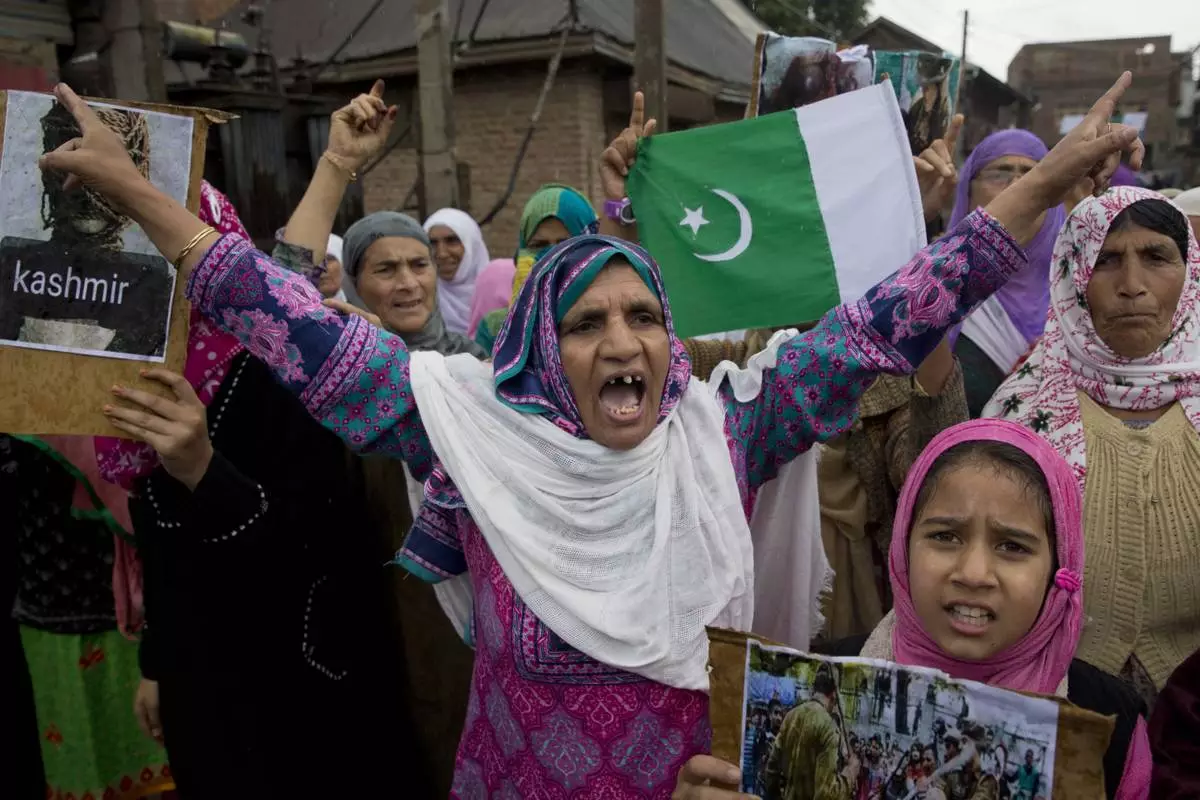
Kashmiris shout slogans during a protest after Friday prayers against the abrogation of article 370, on the outskirts of Srinagar, Indian controlled Kashmir, Friday, Oct. 4, 2019.(AP Photo/ Dar Yasin, File)
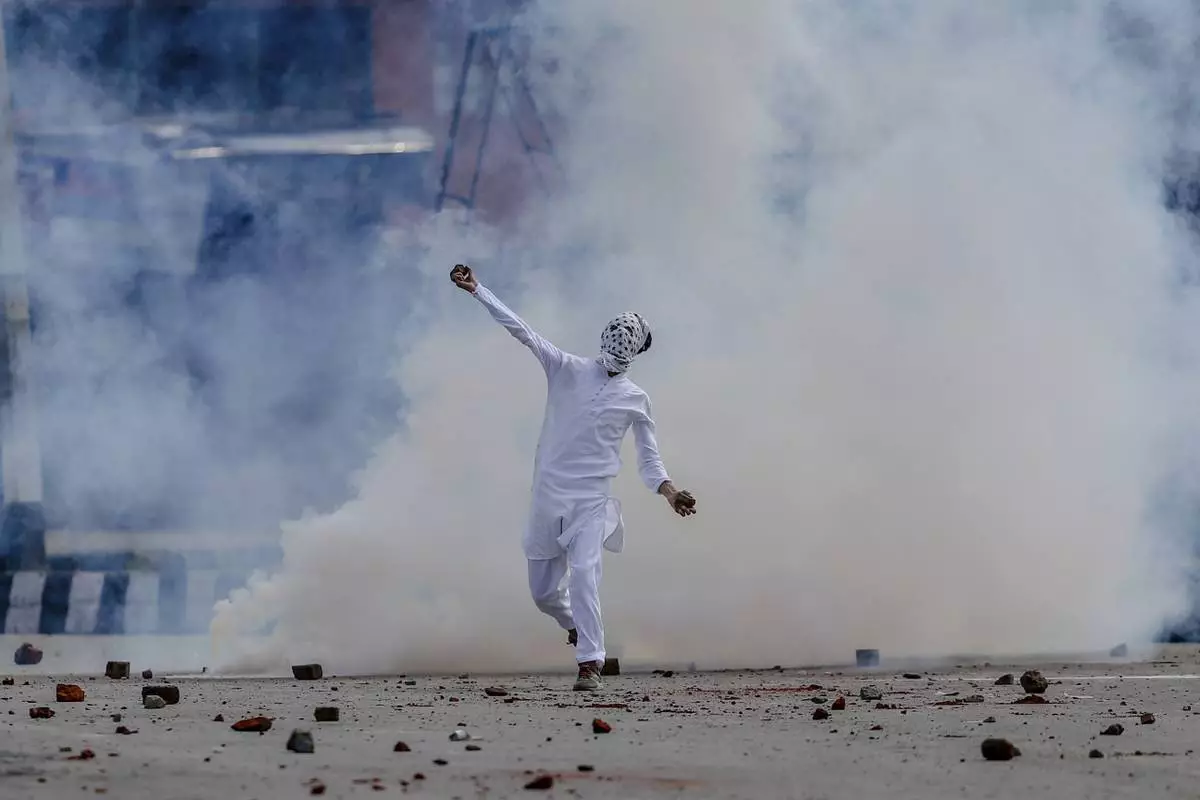
A masked protester throws stone at Indian security forces during a protest after Eid prayers in Srinagar, Indian controlled Kashmir, Saturday, June 16, 2018. (AP Photo/Dar Yasin, File)
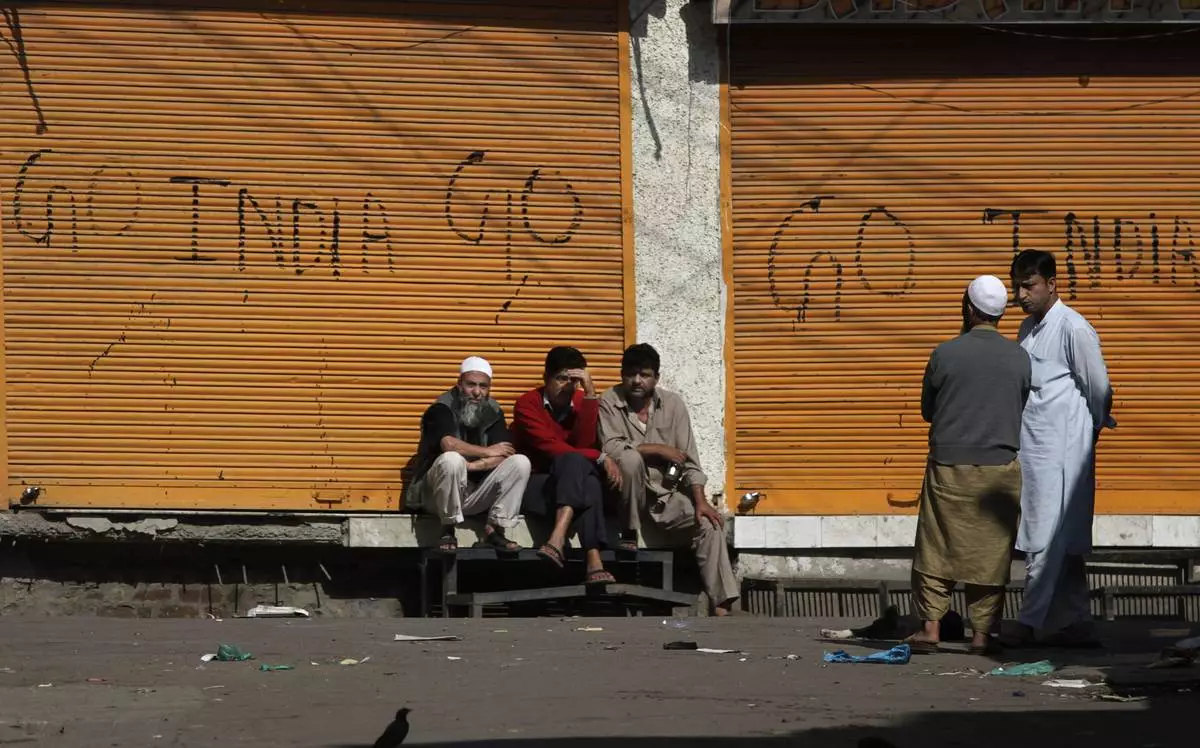
Kashmiris sit outside closed shops painted with graffiti during a curfew in central Srinagar, India, Thursday, Sept. 16, 2010. (AP Photo/Dar Yasin, File)









